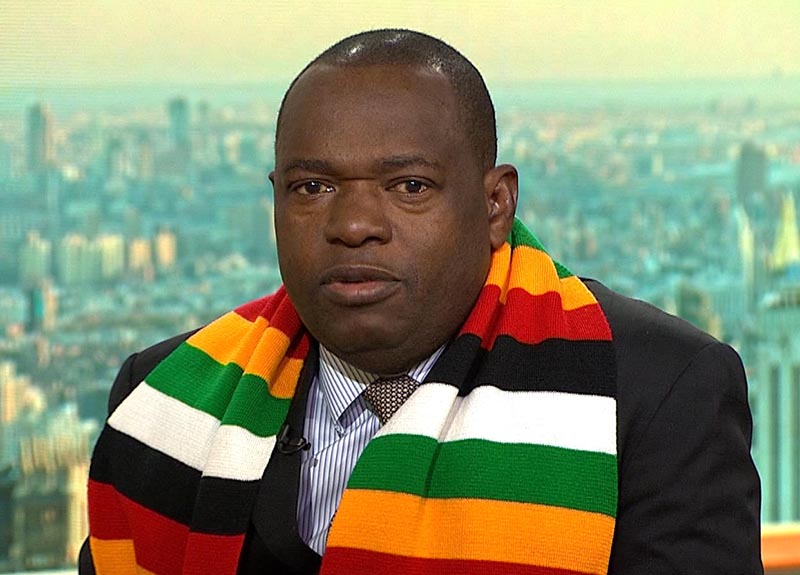
The attitude of the Zimbabwean government towards human rights protection is morbid, myopic and sickening. Based on the responses issued by top officials to the European Union delegation to the Republic of Zimbabwe, it is a fact that our government, like a terrorist establishment, is seeking to use repression against its own citizens as a weapon to curve the United States government into lifting sanctions imposed on the Zanu PF-led government during the turn of the millennium.
A closer look at the statement issued by Foreign Affairs minister Sibusiso Moyo (pictured) to the European missions is very disturbing. He said: “Lifting sanctions and increasing international investment will speed land and security sector reforms and enhance the protection of human rights.” From the minister’s statement it is, indeed, safe to conclude that the government has declared it will not stop violating human rights until sanctions are lifted.
In that single statement, the government of Zimbabwe showed its true colours, specifically its unwillingness to repent. Furthermore, it registered its disinterest in human rights observances, showing also that it is ready to sue for the removal of sanctions by the European Union by any other means possible, including by hook and crook. Before the Foreign Affairs minister came out with that horrifying speech, the secretary for Information, Media and Broadcasting Services, Ndavaningi Mangwana was first to release a Press statement, accusing Western governments of interfering in the country’s domestic affairs. In his official statement, Mangwana did not deviate a bit from the pompous tone and “government is always right” attitude that has contaminated the Zanu PF-led government since time immemorial.
The governments of France, Germany, Greece, Netherlands, Romania, Sweden, the United Kingdom, United States and Australia were altogether quoted and blamed for issuing a biased statement on human rights and freedom of assembly. Mangwana, representing the government, denied that human rights were violated, saying instead that opposition leaders had broken the law by defying a High Court order stopping the demonstrations.
There is an obvious question of the constitutionality of demonstrations as enshrined in section 59 of the country’s Constitution versus the immediate legality of demonstrations derived from outdated laws that Mangwana deliberately avoided in his Press release. The partisan tone in his speech discredits the commitment and solemnity of the government to return to constitutionalism.
It is grim that human rights in Zimbabwe are treated as favours that the government can give or take away at any time they so wish. The truthful definition of humanity and human rights has never been stencilled into the DNA of the government of the day. Human rights are legal and moral entitlements that all humans should be guaranteed by virtue of them being human, not by the benefit of a court verdict.
In his statement, Mangwana said, “The statement by the missions fail to acknowledge that the High Court made a well-considered judgment on the legality of the demonstrations… We, therefore, note with concern that the mission’s statement appears not to acknowledge this position of the law.”
It is quite tempting to side with Mangwana due to his mention of the law and legal axioms, but also important to note the law which he is referring. Otherwise, that Public Order and Security Act used to ban protests is clearly unjust and unconstitutional. Therefore, Mangwana’s position on legality is more like how the underwriters of apartheid and slavery viewed the ordeal faced by the blacks as legal.
- Chamisa under fire over US$120K donation
- Mavhunga puts DeMbare into Chibuku quarterfinals
- Pension funds bet on Cabora Bassa oilfields
- Councils defy govt fire tender directive
Keep Reading
The fact that the courts in Zimbabwe can use a repealed law to make a judgment denying citizens their political rights is a telltale signal that the judiciary is captured by a political party. It is a fairly credible assertion since the common perception in the Zanu PF party is that the political party is above government and, therefore, dictates the pace, procedure and outcome of everything by anyone appointed by the President.
That should surely knock some sense in the corridors of power that the government does not have to win the bargain against sanctions by sacrificing its citizens and abusing human rights.
While a consensus has been reached at the Southern African Development Community towards the removal of United States sanctions imposed on Zimbabwe, it is absolutely necessary to consider that repression against citizens is two steps backwards against one step forward. There is no condition the Mnangagwa administration should give in order to guarantee civil and political rights because it is, indeed, the primary duty of any government to protect its citizens. Neither must they be viewed as the price to get international goodwill, but the right step forward.
Takudzwanashe Mundenga is an opinion writer interested in African politics and the economy. He writes in his personal capacity. For comments and feedback, please feel free to reach him at [email protected]











